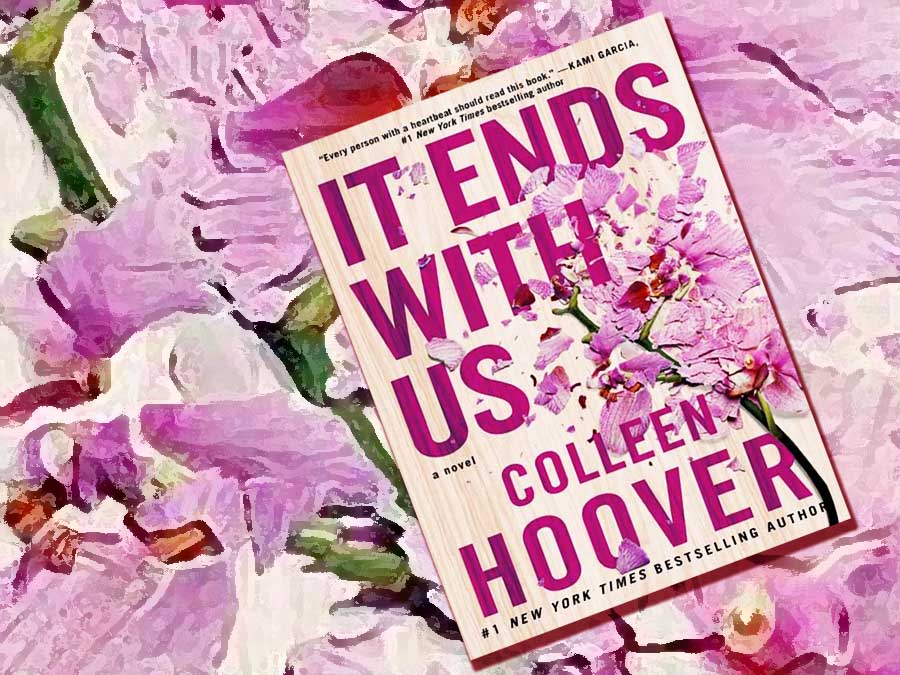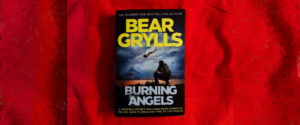As I admitted in my blog post from the end of January about the value of a social media presence for emerging writers, until I saw her name topping bestseller lists in Britain and the USA, I’d never heard of Colleen Hoover. Inevitably, the next time I visited my local library, I couldn’t avoid seeing her name. There were books by her on display, there were five or six titles by her on the “English fiction” shelves, and at least one in the returns cart, waiting to be re-shelved.
It seemed like the god of books was directing me towards my next read.
It ends with mixed feelings
One of the display copies was It Starts with Us, which rang a bell. I must have read a bit about it on Wikipedia when I was finding out who Colleen Hoover was. I picked it up, but the blurb suggested it was a sequel to It Ends with Us. That was the title I found in the returns cart, and borrowed. It took me eight days to read it, reading in parallel with another book, and I finished it yesterday.
I have very mixed feelings about this book.
On the one hand, it is well written, the language flows. It’s not a difficult read. It doesn’t have a lot of modern slang or jargon. It’s straightforward. More than that the subject matter (physically abusive relationships and the complexity of the emotional entanglement of the people involved) is important and well presented. Up to a point.
On the other hand, the book is so packed with clichés and tired tropes from American TV dramas that I metaphorically gagged several times and nearly gave up reading before I reached Part Two. (Part Two is the grittier part of the book. In it the relationship between the protagonist Lily and her boyfriend/husband Ryle deteriorates.)
It ends with non-fiction
I’m glad I stuck it out, because the book improves in the second half. Colleen Hoover’s afterword, the Note from the Author, reveals the non-fictional basis for her story, drawn from her own life. This truth is what cuts through the otherwise relentless banality of the novel and procession of stereotypes doing duty as characters.
All the main characters are wealthy and successful. Ryle, the secretly abusive boyfriend/husband is a successful neurosurgeon. Marshall his brother-in-law is a software designer who has created and sold apps to Apple for a vast sum. Enough for him to buy the whole penthouse suitewhere he lives at the top of a Boston apartment block. Atlas, the heroic saviour character, is a successful and acclaimed local chef and restaurateur. And a military veteran. Lily the protagonist sinks her inheritance from her dead father into a flower shop, which (astonishingly) quickly becomes commercially successful. There are even a couple of characters who are independently wealthy but so bored they dabble in low-paid menial jobs to keep themselves occupied.
Is Hoover using these tropes because her genre is romantic fiction? Does she feel it’s necessary to satisfy the expectations of her readership? I suppose so. But for me it threw the whole story into doubt. The detailed sex scenes between Lily and Ryle also felt drawn from pornographic movies rather than real life. Soft-core pornography to be fair, but still porn.
It ends with scrubs
The detail that a neurosurgeon would come home from a long day in the operating theatre still wearing his scrubs I thought was beyond credibility. (Not to mention that Lily would find it arousing rather than unhygienic.) So far beyond credibility that I went online looking to see if it was even possible. I’m sorry to say that in the US, apparently, it is.
It seems many hospitals expect their employees to buy their own scrubs, and don’t provide changing facilities. Many health workers then feel they might as well wear their work clothes to travel to and from work. Fortunately, as far as I can ascertain, surgeons and other people working in sterile environments – operating theatres – do wear scrubs provided by their hospital and are expected to change into sterile clothing before they enter the operating theatre. Also they’re expected to change out of their used scrubs – even if into other scrubs – after they leave the theatre.
It ends with violence and trauma
The violence of the story’s two abusive men (Lily’s father and Ryle), is presented as alcohol-related for the one and the result of a childhood trauma for the other. Not a whisper of social criticism here. It is the men themselves, not their upbringing or the pressure of societal norms that make them violent.
As for that trauma … When they were six and seven years old, Ryle killed his elder brother with a loaded gun. They were playing in their garage. The book just sails by this with barely a passing glance. Of course loaded guns can be found in American garages. Of course children play with them. It stands to reason that sometimes one child kills another. That’s just the way it is. The killer-boy is traumatised, but what are you going to do? Presumably the gun belonged to the children’s parents, but we don’t know.
It ends with an afterword and “resources”
In the afterword Colleen Hoover describes how, as a child, she witnessed her mother’s abuse at the hands of her father. One of these incidents is incorporated into the novel. She also praises her mother’s decision, ultimately, to leave her husband and take her daughters to safety.
Unlike Lily, my mother didn’t have a lot of support. There were no local women’s shelters. There was very little government support back then. To leave meant risking not having a roof over our heads, but to her it was better than the alternative.
I don’t really know what she means by this. Lily’s principal support comes from her one-time boyfriend Atlas. There is no mention of women’s shelters, no breath even of the possibility that society or a charity might offer a refuge.
At the very end of the book there is a page entitled Resources. This is for readers if “you are a victim of domestic violence or know someone who could use assistance in leaving a dangerous situation” and “for homeless individuals”. There are links to two US websites. No doubt they do a great job in the USA. But this is book is internationally published – according to the title page in “New York, London, Toronto, Sydney, New Delhi”. So why not boost similar organisations in the UK, Canada, Australia, India?
So there we are. Five stars for putting marital abuse into a romantic novel and portraying it as complex. Minus four stars for everything else.





